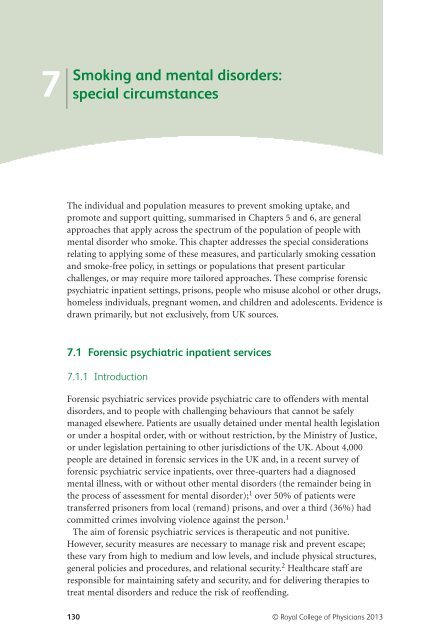Smoking and mental health - NCSCT
Smoking and mental health - NCSCT
Smoking and mental health - NCSCT
Create successful ePaper yourself
Turn your PDF publications into a flip-book with our unique Google optimized e-Paper software.
7<br />
<strong>Smoking</strong> <strong>and</strong> <strong>mental</strong> disorders:<br />
special circumstances<br />
The individual <strong>and</strong> population measures to prevent smoking uptake, <strong>and</strong><br />
promote <strong>and</strong> support quitting, summarised in Chapters 5 <strong>and</strong> 6, are general<br />
approaches that apply across the spectrum of the population of people with<br />
<strong>mental</strong> disorder who smoke. This chapter addresses the special considerations<br />
relating to applying some of these measures, <strong>and</strong> particularly smoking cessation<br />
<strong>and</strong> smoke-free policy, in settings or populations that present particular<br />
challenges, or may require more tailored approaches. These comprise forensic<br />
psychiatric inpatient settings, prisons, people who misuse alcohol or other drugs,<br />
homeless individuals, pregnant women, <strong>and</strong> children <strong>and</strong> adolescents. Evidence is<br />
drawn primarily, but not exclusively, from UK sources.<br />
7.1 Forensic psychiatric inpatient services<br />
7.1.1 Introduction<br />
Forensic psychiatric services provide psychiatric care to offenders with <strong>mental</strong><br />
disorders, <strong>and</strong> to people with challenging behaviours that cannot be safely<br />
managed elsewhere. Patients are usually detained under <strong>mental</strong> <strong>health</strong> legislation<br />
or under a hospital order, with or without restriction, by the Ministry of Justice,<br />
or under legislation pertaining to other jurisdictions of the UK. About 4,000<br />
people are detained in forensic services in the UK <strong>and</strong>, in a recent survey of<br />
forensic psychiatric service inpatients, over three-quarters had a diagnosed<br />
<strong>mental</strong> illness, with or without other <strong>mental</strong> disorders (the remainder being in<br />
the process of assessment for <strong>mental</strong> disorder); 1 over 50% of patients were<br />
transferred prisoners from local (rem<strong>and</strong>) prisons, <strong>and</strong> over a third (36%) had<br />
committed crimes involving violence against the person. 1<br />
The aim of forensic psychiatric services is therapeutic <strong>and</strong> not punitive.<br />
However, security measures are necessary to manage risk <strong>and</strong> prevent escape;<br />
these vary from high to medium <strong>and</strong> low levels, <strong>and</strong> include physical structures,<br />
general policies <strong>and</strong> procedures, <strong>and</strong> relational security. 2 Healthcare staff are<br />
responsible for maintaining safety <strong>and</strong> security, <strong>and</strong> for delivering therapies to<br />
treat <strong>mental</strong> disorders <strong>and</strong> reduce the risk of reoffending.<br />
130 © Royal College of Physicians 2013














